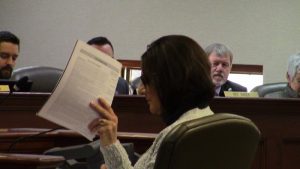Last updated on 2020-02-01
I caught the tail end of a really cool Legislative trick in House Taxation this morning.

One of the wiliest coyotes in the House, Republican Representative Elizabeth May brought House Bill 1309, which would—holy cow! the day after Senate Taxation killed the latest Democratic effort to repeal the food tax—repeal sales tax exemptions for medical services, advertising, and movie rentals and repeal the food tax. Casting doubt on the Department of Revenue’s estimates as outdated lowballs, Rep. May said we could get $56.7 million in sales tax from Sanford alone and over $280 million (almost $300 million, she eagerly rounded up) from all of the exemption repeals in HB 1309. May contended that taxing doctor visits and billboards but not groceries would yield new net revenue of $218 million per year.
Read that again: a Republican just proposed a 218-million-dollar tax increase. Uff da! No wonder she had only three co-sponsors.
Everybody and the sisters (yes, Sister Welbig, from the Presentation Sisters, who support helping the hungry but not on the backs of the sick) got up to come down on Liz May for proposing such egregious taxes on important South Dakota industries.
But Liz May wasn’t really trying to raise taxes or repeal the tax on food. She said in her rebuttal that she used HB 1309 to drag industry opponents out of the woodwork to defend their exemptions, to get each of them to explain why taxing them would be so ugly. “Taxing food is an ugly tax,” said May, so why not talk about axing those other industries?
Then Rep. May lobbed her procedural grenade. She moved to hoghouse her own bill, striking every line of HB 1309 and instead calling for a quadrennial review of every sales tax exemption granted in Chapter 10-45, with the first full review to be completed by 2023.
Caught unawares and short on time, Vice-Chair Mark Willadsen deferred May’s hoghouse to House Taxation’s next meeting, on Thursday morning.
I like Representative May’s move this morning, and not just because it carries the pleasant cigar-like aroma of craftiness. Sales tax exemptions get tacked on willy-nilly, one or two special interests at a time, until they add up to (and remember, Liz says this is low!) $1.113 billion a year that could pay our teachers and cops instead of favoring certain industries. That’s 70% of the $1.586-billion revised revenue estimate for this fiscal year that Joint Appropriations adopted this morning. Measures that leave that big of a hole in state revenue deserve some periodic review, with updated figures, so we can get a current picture of how certain favored industries are doing and what they could do to support the state’s fiscal health.
The Legislature commissioned a sales tax review panel in 2011; that committee suggested trimming $332,000 worth of exemptions. Representative May would reconvene such a panel at least every four years, if not every year to eat a quarter of the elephant at a time.
HB 1309 as hoghoused is a tough bill to handicap. It promotes discussion and, possibly, higher taxes, and a lot of Republicans in Pierre are allergic to both. But not Elizabeth May.
Good for Liz May. The exposure of places we can get taxes from will help to alleviate the cuts we can expect to Medicare and Medicaid for our neighbors in nursing homes and in general. https://www.bloomberg.com/news/articles/2018-02-12/trump-to-urge-wall-opioid-spending-as-congress-sets-own-course Wonder what Jackley and NOem have to say about these cuts to our elderly and disabled?
While I’m curious about what exemptions exist, I worry about their economic impact.
I can understand removing exemptions for advertisement and movie theatres, but healthcare services should garner closer scrutiny.
Raising $139.5 million in sales/use tax off healthcare (looking at your tax expenditures sheet) means all our insurance premiums / out of pocket costs go up that much to pay for that tax. Forcing non-profit hospitals to pay sales tax on equipment & supplies will further raise costs of healthcare services.
Remember, this isn’t a tax on Sanford, Avera, Regional Health, or any particular hospital; it’s a tax on us, the end user of those healthcare services.
Jerry touches on another confounding issue. If HHS cuts reimbursement rates for Medicare & Medicaid, we can expect our private insurance rates to climb to compensate for that lost revenue.
Healthcare is not a luxury. Increasing the cost of getting that care is going to put it out of reach for more folks, and create greater hardships for those that do access it.
Wayne, in general, I agree with your priorities: If we are picking and choosing, let’s repeal the advertising exemption before we repeal the health services exemption. Raising the cost of healthcare has immediate negative fiscal impacts on state government. Raising the cost of advertising has little if any such impact on the state.
But that’s the kind of discussion we can have if Rep. May’s hoghouse passes and we review the exemptions list every four years.
I wonder: do we need to review that frequently? Would ten years be a better time frame for review?
Every tax on everything ends being a tax on us, the low man on the totem pole, since they are all passed on to the consumer. I think Ms May is just trying to get some serious dialog going on all the exemptions. And, yes, It makes me gain respect for a few of the folks on the R side of the aisle.
TAX THE CREDIT UNIONS